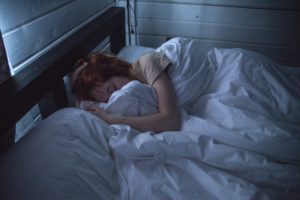Can our anxiety be impacted by the quantity and quality of sleep? Can our sleep be impacted by anxiety? Not surprisingly, the answer to both questions is a resounding YES! According to research sleep deprivation can intensify one’s anxiety and anxiety can exacerbate our ability to fall asleep and stay asleep through the night, Insufficient sleep can have negative effects on one’s overall health. Anxiety disorders affect the lives of around 20% of American adults and 25% of teenagers!
Evidence indicates that sleeping problems are not only a symptom of anxiety, but that sleep deprivation can instigate or worsen anxiety disorders. Researchers have found that people who are prone to anxiety are especially sensitive to the effects of insufficient sleep, which can provoke symptoms of anxiety. How can we possibly stop this cycle of distress?
The good news is that these disorders can be treated. At Integrated Anxiety Management we have had great success using Cognitive behavioral Therapy (CBT) to help reorient one’s thinking which decreases feelings of anxiety and CBT is also useful in addressing insomnia.
However, there are some simple changes you can make at home that can help you to take control of this cycle.
- Follow a regular sleep schedule. This means that you go to bed and wake up at the same time each day. This trains your body’s biological clock to be in harmony with all your other bodily functions. By creating this habit, you are allowing your body to create a regular rhythm which it can fall into, and this helps you to fall asleep and wake up at the appointed times. If you are not sure how many hours of sleep you need take a look at the sleep calculator from thesleepdoctor.com website.
- Eliminate caffeine after 2pm. Caffeine is a stimulant, and if one can allow all the caffeine to leave your system (which takes about 8 hours) by the time you are ready for bed it won’t prevent you from falling asleep or sleeping soundly.
- Don’t consume any alcohol within 3 hours of bedtime. Many people who suffer from insomnia report using alcohol as a sleep aid. While alcohol may act as a sedative and put you to sleep, it can interfere with a good night’s sleep in multiple ways: it prevents you from reaching the deeper stages of sleep, it relaxes the muscles in your airways which can lead to snoring and sleep apnea, alcohol dehydrates you which may disturb your sleep to get up and get drink or go to the bathroom.
- Finally, moderate physical activity is key to restful sleep. Find an exercise routine that works for you and try to stick to it. Data suggests that not only will this help you fall asleep more quickly but induce a deeper more satisfying rest.
You don’t have to live with poor sleep. By trying these steps to improve your sleep habits you can reduce your anxiety and find the rest and greater health you deserve. If Integrated Anxiety Management can help you in any way give us a call or send us an email and let us know how we can help. Sleep well!
